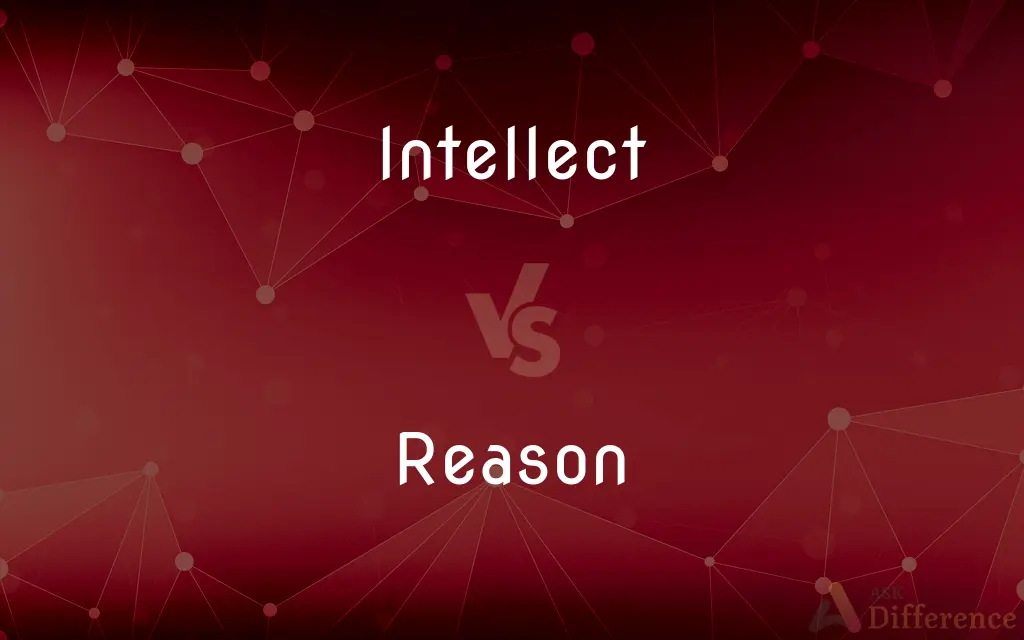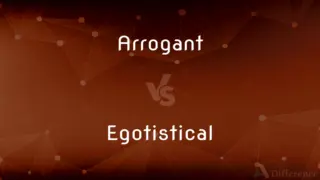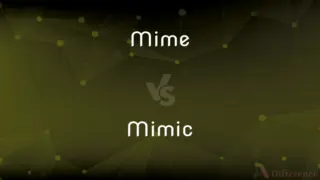Intellect vs. Reason — What's the Difference?
By Maham Liaqat & Fiza Rafique — Updated on April 5, 2024
Intellect is the faculty of understanding, knowledge, and thinking, whereas reason involves logical thinking and the ability to form judgments.

Difference Between Intellect and Reason
Table of Contents
ADVERTISEMENT
Key Differences
Intellect encompasses the cognitive abilities to think, understand, and learn, being a broader concept that includes creativity, memory, and knowledge acquisition. Reason, on the other hand, is more specifically associated with logical thinking, deduction, and the rational process of forming conclusions and judgments.
While intellect represents the mental capacity for knowledge and understanding across various fields and disciplines, reason is used to apply logical principles to solve problems, make decisions, and formulate philosophical arguments. Reason relies on intellect as a foundation but is more narrowly focused on logic and rationality.
Intellect is often considered a measure of intelligence or mental capability, encompassing both innate cognitive abilities and acquired knowledge. Reason, whereas, is seen as the application of intellectual capabilities to analyze and make sense of information, leading to rational thought and decisions.
The development of intellect is a lifelong process influenced by education, experiences, and environmental factors, aiming at broadening one’s understanding and cognitive abilities. Reason, conversely, is honed through critical thinking, formal logic, and the disciplined practice of examining arguments and beliefs.
Intellect can manifest in various forms, including artistic creativity, scientific discovery, and philosophical thought, showcasing the diverse ways the human mind can understand and interpret the world. Reason, though, is primarily concerned with the logical structuring of thoughts, often applied in debates, scientific research, and ethical decision-making.
ADVERTISEMENT
Comparison Chart
Definition
The faculty for thinking, understanding, and knowledge.
The capacity for logical thought, understanding, and judgment.
Scope
Broad, encompassing various cognitive abilities.
Focused on logic and rational analysis.
Application
General intelligence, creativity, learning.
Problem-solving, decision-making, philosophical analysis.
Development
Influenced by education, experiences.
Developed through practice in critical thinking and logic.
Manifestation
Can be creative, scientific, philosophical.
Primarily logical and analytical.
Compare with Definitions
Intellect
The ability to understand and learn complex concepts.
Her intellect is evident in her ability to speak multiple languages fluently.
Reason
The process of thinking about something in a logical way.
She used reason to solve the complex puzzle.
Intellect
Intellectual growth is encouraged through diverse learning and critical thinking.
Engaging in debates and reading widely expands one's intellect.
Reason
Reason is essential in scientific inquiry, guiding hypotheses and conclusions.
The researcher applied reason to interpret the experimental data accurately.
Intellect
A well-developed intellect is often associated with academic success and knowledge acquisition.
Her intellect has led her to achieve top honors in her studies.
Reason
Reason involves applying logic to form judgments or conclusions.
Through reason, he deduced the answer to the philosophical question.
Intellect
Intellect can manifest in understanding abstract concepts and solving complex problems.
The architect’s intellect is apparent in her innovative designs.
Reason
Critical thinking is a key aspect of reason, enabling the evaluation of arguments.
His ability to reason through difficult problems makes him an excellent leader.
Intellect
Intellect encompasses cognitive functions such as memory, analysis, and creativity.
His intellect shines through in both his chess strategies and scientific research.
Reason
Ethical decision-making often relies on reason to weigh options and consequences.
She used reason to determine the most ethical course of action.
Intellect
In the study of the human mind, intellect refers to and identifies the ability of the mind to reach correct conclusions about what is true and what is false, and about how to solve problems. The term intellect derives from the Ancient Greek philosophy term nous, which translates to the Latin intellectus (from intelligere, “to understand”) and into the French and English languages as intelligence.
Reason
Reason is the capacity of consciously applying logic to seek truth and draw conclusions from new or existing information. It is closely associated with such characteristically human activities as philosophy, science, language, mathematics, and art, and is normally considered to be a distinguishing ability possessed by humans.
Intellect
The ability to learn and reason; the capacity for knowledge and understanding
"Opinion is ultimately determined by the feelings, and not by the intellect" (Herbert Spencer).
Reason
The basis or motive for an action, decision, or conviction
There are good reasons to learn a foreign language. See Usage Notes at because, why.
Intellect
A person's individual ability to think and reason
"[His] humanitarianism could never overcome the rigidities of his intellect or the shortcomings of his temperament" (Michael B. Stoff).
Reason
A declaration made to explain or justify action, decision, or conviction
What reasons did she give for leaving?.
Intellect
A person of great intellectual ability
"Gifted as both an athlete and an intellect, [he] received help from teachers who recognized his talents" (Anita Silvey).
Reason
A fact or cause that explains why something exists or has occurred
The reason for the building's collapse is unknown.
Intellect
(uncountable) The faculty of thinking, judging, abstract reasoning, and conceptual understanding; the cognitive faculty.
Intellect is one of man's greatest powers.
Reason
(Logic) A premise, usually the minor premise, of an argument.
Intellect
(uncountable) The capacity of that faculty (in a particular person).
They were chosen because of their outstanding intellect.
Reason
The capacity for logical, rational, and analytic thought; intelligence
"Most of us would like to believe that when we say something is right or wrong, we are using our powers of reason alone" (Carl Zimmer).
Intellect
A person who has that faculty to a great degree.
Some of the world's leading intellects were meeting there.
Reason
The limit of what is reasonable
"It is a curious thing that, when a man hates or loves beyond reason, he is ready to go beyond reason to gratify his feelings" (Rudyard Kipling).
Intellect
The part or faculty of the human mind by which it knows, as distinguished from the power to feel and to will; the power to judge and comprehend; the thinking faculty; the understanding.
Reason
A normal mental state; sanity
He has lost his reason.
Intellect
The capacity for higher forms of knowledge, as distinguished from the power to perceive objects in their relations; mental capacity.
Reason
To determine or conclude by logical thinking
The doctor reasoned that the patient had a virus.
Intellect
A particular mind, especially a person of high intelligence; as, he was a great intellect.
Reason
To persuade or dissuade (someone) with reasons
"You boast ... of having reasoned him out of his absurd romance" (William Makepeace Thackeray).
Intellect
Knowledge and intellectual ability;
He reads to improve his mind
He has a keen intellect
Reason
To use the faculty of reason; think logically
What would lead you to reason so?.
Intellect
The capacity for rational thought or inference or discrimination;
We are told that man is endowed with reason and capable of distinguishing good from evil
Reason
To talk or argue logically and persuasively
Tried to reason with her son to eat a good breakfast.
Intellect
A person who uses the mind creatively
Reason
(Obsolete) To engage in conversation or discussion.
Reason
A cause:
Reason
That which causes something: an efficient cause, a proximate cause.
The reason this tree fell is that it had rotted.
Reason
A motive for an action or a determination.
The reason I robbed the bank was that I needed the money.
If you don't give me a reason to go with you, I won't.
Reason
An excuse: a thought or a consideration offered in support of a determination or an opinion; that which is offered or accepted as an explanation.
Reason
(logic) A premise placed after its conclusion.
Reason
(uncountable) Rational thinking (or the capacity for it); the cognitive faculties, collectively, of conception, judgment, deduction and intuition.
Mankind should develop reason above all other virtues.
Reason
(obsolete) Something reasonable, in accordance with thought; justice.
Reason
Ratio; proportion.
Reason
(intransitive) To deduce or come to a conclusion by being rational
Reason
(intransitive) To perform a process of deduction or of induction, in order to convince or to confute; to argue.
Reason
To converse; to compare opinions.
Reason
(ambitransitive) To arrange and present the reasons for or against; to examine or discuss by arguments; to debate or discuss.
I reasoned the matter with my friend.
Reason
To support with reasons, as a request.
Reason
(transitive) To persuade by reasoning or argument.
To reason one into a belief; to reason one out of his plan
Reason
To overcome or conquer by adducing reasons.
To reason down a passion
Reason
To find by logical process; to explain or justify by reason or argument.
To reason out the causes of the librations of the moon
Reason
A thought or a consideration offered in support of a determination or an opinion; a just ground for a conclusion or an action; that which is offered or accepted as an explanation; the efficient cause of an occurrence or a phenomenon; a motive for an action or a determination; proof, more or less decisive, for an opinion or a conclusion; principle; efficient cause; final cause; ground of argument.
I'll give him reasons for it.
The reason of the motion of the balance in a wheel watch is by the motion of the next wheel.
This reason did the ancient fathers render, why the church was called "catholic."
Virtue and vice are not arbitrary things; but there is a natural and eternal reason for that goodness and virtue, and against vice and wickedness.
Reason
The faculty or capacity of the human mind by which it is distinguished from the intelligence of the inferior animals; the higher as distinguished from the lower cognitive faculties, sense, imagination, and memory, and in contrast to the feelings and desires. Reason comprises conception, judgment, reasoning, and the intuitional faculty. Specifically, it is the intuitional faculty, or the faculty of first truths, as distinguished from the understanding, which is called the discursive or ratiocinative faculty.
We have no other faculties of perceiving or knowing anything divine or human, but by our five senses and our reason.
In common and popular discourse, reason denotes that power by which we distinguish truth from falsehood, and right from wrong, and by which we are enabled to combine means for the attainment of particular ends.
Reason is used sometimes to express the whole of those powers which elevate man above the brutes, and constitute his rational nature, more especially, perhaps, his intellectual powers; sometimes to express the power of deduction or argumentation.
By the pure reason I mean the power by which we become possessed of principles.
The sense perceives; the understanding, in its own peculiar operation, conceives; the reason, or rationalized understanding, comprehends.
Reason
Due exercise of the reasoning faculty; accordance with, or that which is accordant with and ratified by, the mind rightly exercised; right intellectual judgment; clear and fair deductions from true principles; that which is dictated or supported by the common sense of mankind; right conduct; right; propriety; justice.
I was promised, on a time,To have reason for my rhyme.
But law in a free nation hath been ever public reason; the enacted reason of a parliament, which he denying to enact, denies to govern us by that which ought to be our law; interposing his own private reason, which to us is no law.
The most probable way of bringing France to reason would be by the making an attempt on the Spanish West Indies.
Reason
Ratio; proportion.
When anything is proved by as good arguments as a thing of that kind is capable of, we ought not, in reason, to doubt of its existence.
Yet it were great reason, that those that have children should have greatest care of future times.
Reason
To exercise the rational faculty; to deduce inferences from premises; to perform the process of deduction or of induction; to ratiocinate; to reach conclusions by a systematic comparison of facts.
Reason
Hence: To carry on a process of deduction or of induction, in order to convince or to confute; to formulate and set forth propositions and the inferences from them; to argue.
Stand still, that I may reason with you, before the Lord, of all the righteous acts of the Lord.
Reason
To converse; to compare opinions.
Reason
To arrange and present the reasons for or against; to examine or discuss by arguments; to debate or discuss; as, I reasoned the matter with my friend.
When they are clearly discovered, well digested, and well reasoned in every part, there is beauty in such a theory.
Reason
To support with reasons, as a request.
Reason
To persuade by reasoning or argument; as, to reason one into a belief; to reason one out of his plan.
Men that will not be reasoned into their senses.
Reason
To overcome or conquer by adducing reasons; - with down; as, to reason down a passion.
Reason
To find by logical processes; to explain or justify by reason or argument; - usually with out; as, to reason out the causes of the librations of the moon.
Reason
A rational motive for a belief or action;
The reason that war was declared
The grounds for their declaration
Reason
An explanation of the cause of some phenomenon;
The reason a steady state was never reached was that the back pressure built up too slowly
Reason
The capacity for rational thought or inference or discrimination;
We are told that man is endowed with reason and capable of distinguishing good from evil
Reason
The state of having good sense and sound judgment;
His rationality may have been impaired
He had to rely less on reason than on rousing their emotions
Reason
A justification for something existing or happening;
He had no cause to complain
They had good reason to rejoice
Reason
A fact that logically justifies some premise or conclusion;
There is reason to believe he is lying
Reason
Decide by reasoning; draw or come to a conclusion;
We reasoned that it was cheaper to rent than to buy a house
Reason
Present reasons and arguments
Reason
Think logically;
The children must learn to reason
Common Curiosities
What is intellect?
Intellect refers to the faculty of the mind for understanding, thinking, and acquiring knowledge.
Can intellect exist without reason?
Intellect includes various cognitive functions, including creativity, which might not always involve reason, but reason cannot exist without the underlying intellectual capacity.
Can reason be biased?
While reason aims at objectivity, it can be influenced by biases, emotions, and subjective experiences, highlighting the importance of critical thinking to identify and mitigate such biases.
How does reason differ from intellect?
Reason is a subset of intellect, specifically focused on logical thinking and the rational process of forming judgments, whereas intellect encompasses a broader range of cognitive abilities.
How do we develop our intellect and reason?
Intellect is developed through education, experiences, and engaging in diverse cognitive activities, while reason is honed through critical thinking, logical exercises, and the disciplined examination of ideas and arguments.
Does everyone have the same level of intellect and reason?
Individual levels of intellect and reason vary due to genetic factors, educational opportunities, environmental influences, and personal experiences.
How do intellect and reason impact society?
They drive scientific discovery, technological advancement, ethical decision-making, and cultural development, contributing to societal progress and problem-solving.
Is reasoning always logical?
Reasoning aims to be logical, but human reasoning can sometimes fall prey to logical fallacies or emotional influences, which can lead to illogical conclusions.
Is intellect the same as intelligence?
Intellect is closely related to intelligence, often used interchangeably, but it specifically refers to the cognitive capabilities for learning and understanding.
Are there different types of intellect?
Yes, theories such as Gardner's Multiple Intelligences suggest that intellect can manifest in various forms, including linguistic, mathematical, spatial, and interpersonal intelligences, among others.
How do intellect and reason relate to creativity?
While intellect provides the cognitive foundation for creative thought, reason can structure and refine creative ideas, showing that creativity can benefit from both intellect and logical analysis.
Why is reason important?
Reason is crucial for making informed decisions, solving problems, and engaging in effective communication and debate, allowing for rational and logical analysis.
What role does education play in developing intellect and reason?
Education is fundamental in developing both intellect and reason, providing the knowledge base and critical thinking skills necessary for intellectual growth and rational analysis.
How can we improve our ability to reason?
Improving reasoning abilities involves practicing logical thinking, engaging in debates, solving puzzles, and critically analyzing arguments and information.
What is the significance of reason in ethics and morality?
Reason plays a key role in ethics and morality by enabling individuals to analyze and evaluate moral dilemmas logically, leading to ethical decisions based on rational considerations.
Share Your Discovery

Previous Comparison
Arrogant vs. Egotistical
Next Comparison
Mime vs. MimicAuthor Spotlight
Written by
Maham LiaqatCo-written by
Fiza RafiqueFiza Rafique is a skilled content writer at AskDifference.com, where she meticulously refines and enhances written pieces. Drawing from her vast editorial expertise, Fiza ensures clarity, accuracy, and precision in every article. Passionate about language, she continually seeks to elevate the quality of content for readers worldwide.















































